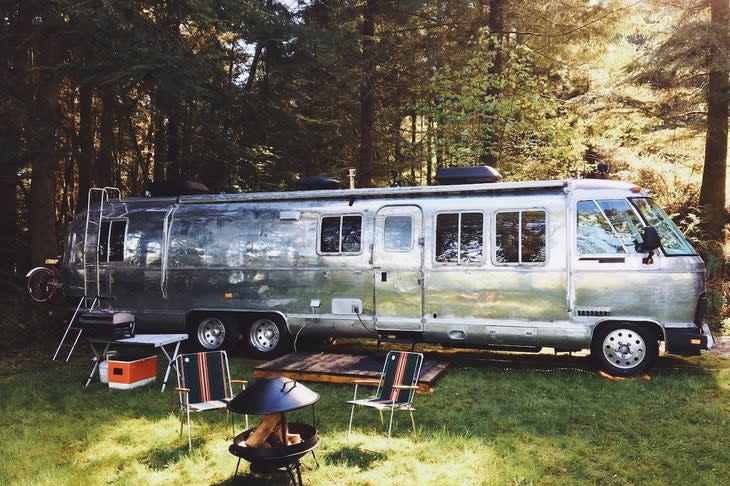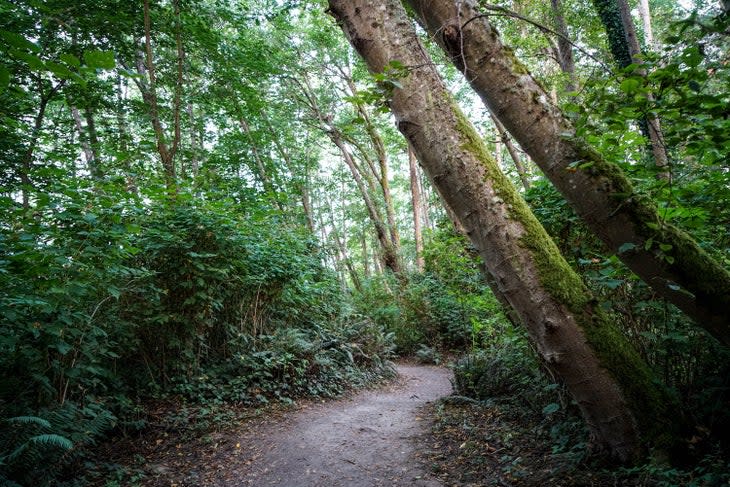This Network of Island Trails in Washington State Was Established by a 1970s Cult
This article originally appeared on Trail Runner
"There's a bunch of trails back there," she said, leaning against her trailer and gesturing to the forest that surrounded us, the north thicket opening up to a view of Washington's Quartermaster Harbor.
"They were made by a cult."
My neighbor assumed I was a runner because of the HOKAs I was wearing the day I moved into an Airstream trailer on Vashon Island, Washington. Eagles dropped oyster shells on the rocks below, screeching in a disconcerting pitch that sounded more like a piccolo than a predator.
I told her I was more hiker than runner, though I did occasionally break into a jog to rid myself of anxious energy. I almost asked more about the cult, but before I could, she added, "they were nudists, too. Must have been painful work."
She wasn't making this up. The nude part was exaggerated, but not by much. Led by Lou Hillendahl, a disgraced Methodist pastor who needed to hightail out of town to avoid a heresy trial, the Wesleyan Community Church, or "The Fellowship," bought 58 acres of land here in the late 1970s before being disbanded in the 1980s after arrests for abuse took down the cult's leadership. Fashioned under the umbrella of Christianity with Hillendahl acting as a conduit between the members and the Almighty, he preached strict separationism, sobriety, and obedience. He conducted his own version of therapy, including nude therapy sessions that Hillendahl led with families.
Hillendahl was the only member of the cult's leadership eventually taken to trial for the abuses. During the end of the 70s and the start of the 80s Hillendahl's followers built a total of 13 homes. Those followers included children and, according to one survivor, the bulk of the labor was done by children of the cult.

While they built the homes, Hillendahl lived on a heated boat with his wife while the rest of the members lived in canvas army tents in a commune for almost a decade. The details of the cult, like any other, are horrifying. They have been told and retold in the small Vashon community for years, and why wouldn't they be? Not a lot happens on an island whose only thread to the mainland is a ferry. When a cougar swam over from the Olympic Peninsula that summer, it was all anyone talked about in the bars.
And so, the Fellowship became a legend with which to welcome new neighbors, to add a layer of foreboding to the marine fog.
What's left behind? Just the trails the followers made while they built the homes near Quartermaster Harbor, and a few now-overgrown meeting places.
Originally, I had no interest in the trails. Not that summer, anyway. I had moved from Seattle, away from a bad break-up and the cascading disappointments that follow a bad break-up. When I told my best friend I was going to live on the island for the summer, she tilted her head like a cat and reminded me, "you're an extrovert, and you're moving to a remote island? I give it a week."
Her point was both true and irrelevant to me. I didn't want to be an extrovert anymore. I didn't want to need people. Hell, I didn't want to be myself anymore. I wanted to be the kind of person who could find solace in solitude, in not needing anyone but myself.
I wanted to want to be alone. And I did not want to go out on those trails.

In my teen years, I had been a backpacking counselor and in my early twenties a piss-poor runner, before anorexia made it impossible to slam my withering frame into pavement over and over any more. When it became medically necessary to remove running from my life, I was fine with it. As I entered recovery in 2009, my running shoes became a spectral reminder of punishment rather than freedom. After several years in recovery, I found a pace that was much slower – I was a walker, a meanderer, and for a while, a hiker.
However, I had dated so many men who thought hiking was a personality type that I gradually stopped doing that, too. It felt like everything I had ever been or done was for consumption, and that summer I had nothing left for anyone to consume.
But what I still loved very much, just for myself, was writing, and for some reason I couldn't do it anymore. Vashon Island was supposed to be my Walden Pond, except that I didn't have Thoreau's mom to do my laundry.
After a couple of weeks, it became clear that just sitting in an Airstream and playing fetch with my dog wasn't going to do it, inspiration-wise. I couldn't afford to take the $20 ferry to the mainland every day, and I didn't feel fit for company as I cried in my metal tube of a home abutting Puget Sound.
So after a while, I started to walk. I walked into the woods on those trails that had been stamped out by people looking for answers in all the wrong places. I didn't bring headphones; instead, I listened. I listened to the eagles, so big and tough until they opened their silly beaks. I listened for the cougar who recently ate everyone's goats.
All these cult trails were singletrack, not worn by endless trodding or dirt bikes, untouched by erosion. Blackberries reached for each other over ferns to obstruct my way. The first day, I only gained a mile before a tangle of thorns and dense ground cover stopped me.
I came back the next day with gaiters and my neighbor's shears. Just past the berries, I discovered a worn half circle in a grove of trees, split tree trunks turned into benches buried in the ground. It was an attempt at a very small amphitheater, despite the forest attempting to cover the evidence. I laid down on one of the smooth benches, thinking about who sheared blackberries before me, who had sat here having escaped and also seeking another escape.
It all became real very quickly. This dozen-person seating arrangement seemed...mythic. I could see it, feel it. Someone else had been here. Someone else looked for something here.
When I kept walking and shearing the trails, side-stepping standing water to dig little drainage veins with sticks, the stories started to unfold. Who else might come here, looking? Seeking? Who else would come here to shake off their clothes like a cocoon, to shake off who they've been? How are we all so vulnerable when we come to that place of seeking, and why is it so hard to see when we've taken the wrong path?
Deeper in the forest around Quartermaster Harbor, sunlight comes in splotches. The trail would often fade and sputter and a gravel driveway would split off. I would duck behind the trees, startled by the suddenness of company, and retrace my steps to find the whisper of a trail to follow deeper. They were people who lived in back ways connected only to each other. I shivered every time I found another one.
RELATED: Life is a Lot Right Now. Here's How to Know if Running Will Help or Hurt
Something about all of this isolation didn't sit well. After all, cults are meant to cut people off. It's how they inflict the most damage, the most pain. I couldn't stop thinking about it.
It's connection that ends up healing.
This continued for weeks. I couldn't write, so I walked. And eventually, when I was deep enough in the trees, I would run.
I thought about what the trail builders were running from, and what I was running from. I imagined I was running to rather than from, because running to is often blind, whereas running from is vivid and detailed. Toward takes many small steps to stamp out a way forward, slow and painstaking though they may be.
I ended up running every inch of the trails, a network of 10 miles or so, over and over. I became familiar with the singletrack whispers that led me deeper. But I found a different way than those trail builders did. I stopped running from what I feared and started running toward something unknown instead. I no longer wanted to be alone after I had spent so much time with these ghosts. I no longer saw solitude as a moral imperative. After all, Thoreau's mom really did do his laundry. I stopped editing myself, started running when I wanted to run, walking where I wanted to walk, being who I felt like being.
I didn't want to stamp out a trail alone, and I definitely didn't want to travel one alone either. I started writing again. It felt impossible and sudden, but I did. All the time and just for myself. My voice shifted and I followed where it ran, and it felt likely that I had been holding onto a voice that was no longer mine this whole time. Running helped me remember.
That September, I moved off Vashon Island and spent a few months hiking and running in the Austrian Alps, realizing that I wasn't done traversing the paths that others had built, but reaching out to people to come with me, which they did.
Those before me helped clear the way. Trails aren't easily built, after all.
For exclusive access to all of our fitness, gear, adventure, and travel stories, plus discounts on trips, events, and gear, sign up for Outside+ today.

